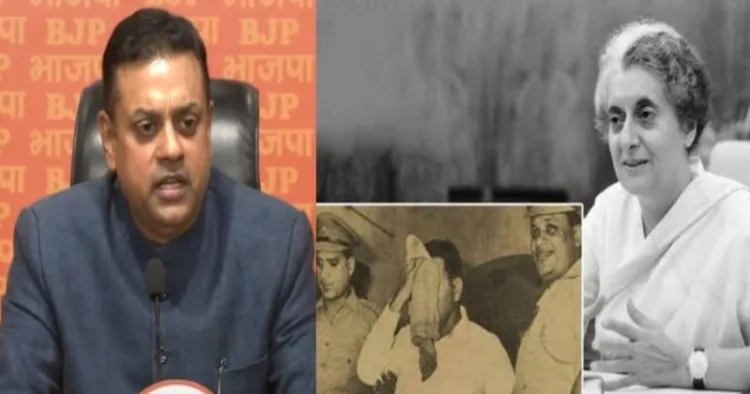The Nagarwala scam, which dates back to 1971, remains one of the most baffling episodes in India’s political and banking history. Involving a high-profile heist, conspiracy theories, and a swift trial, the scandal is best known for its dramatic twists and unanswered questions. Recently, BJP spokesperson Sambit Patra referred to the case in Parliament, linking it to the “phone banking system” of the Congress Party, implying possible political machinations.
The thrilling and mysterious story of banking fraud during Indira Gandhi's government!
On May 24, 1971, Indira Gandhi, the then Prime Minister, allegedly called the Parliamentary Branch Manager of SBI, instructing the immediate release of Rs. 60 lakhs to Nagarwala.
A committee… pic.twitter.com/OANzYkhaUC
— Sambit Patra (@sambitswaraj) December 3, 2024
On 24 May 1971, Ved Prakash Malhotra, the chief cashier at the State Bank of India (SBI), Parliament Street branch in New Delhi, was asked to deliver Rs 60 lakh in cash based on instructions he had received from Prime Minister Indira Gandhi and her secretary, P N Haksar. He took the money from the vault and handed it over to a man named Rustam Sohrab Nagarwala.
Malhotra, believing he had followed the official directive, went to the Prime Minister’s residence to collect a cheque in return. However, he was unable to meet either Haksar or Gandhi. Realising he had been deceived, Malhotra promptly lodged a complaint with the Parliament Street Police Station.
The police tracked down Nagarwala, who was apprehended later that day at the Delhi Parsi Dharamshala in Daryaganj. By evening, the authorities had recovered all but Rs 6,000 of the stolen money, and Nagarwala was arrested. Despite his voluntary confession, Nagarwala later retracted it, claiming that he had been coerced.
Within three days, a lightning-fast trial convicted Nagarwala, sentencing him to four years in prison. His appeal and the lack of evidence added to the intrigue. Assistant Superintendent D K Kashyap, who led the investigation, died in a mysterious road accident shortly thereafter.
The Nagarwala case soon spiralled into a tangle of conspiracy theories. Some speculated that Indira Gandhi and her son, Sanjay Gandhi, were involved in clandestine dealings, including funding the Bangladesh Mukti Bahini during the 1971 Liberation War, while others linked the incident to the influence of the Central Intelligence Agency (CIA). The “small car project” of Sanjay Gandhi, which gained notoriety during the Emergency, also became part of the narrative.
Justice P Jaganmohan Reddy of the Supreme Court was tasked with investigating the case after the Morarji Desai government took office in 1977. His voluminous report criticised the investigation, court procedures, and the State Bank’s role in the scandal. However, the report failed to clarify the ultimate cause or culprits behind the scandal.
Nagarwala’s mysterious death in Tihar Jail in 1972, just months after the trial, and the untimely death of D K Kashyap only deepened the suspicions surrounding the case. The sudden transfer of key officials who investigated the matter further heightened the intrigue, while Indira Gandhi’s silence on the entire affair fueled widespread speculation about her involvement.
In the years since the Nagarwala scam has faded into relative obscurity, but it still casts a long shadow over India’s political and legal history. Journalists Prakash Patra and Rasheed Kidwai have revived the case with their book, “The Scam That Shook India,” exploring declassified files and documents from the Reddy Commission. Their work sheds new light on the unresolved questions, but as with many political scandals of that era, the truth remains elusive. The saga of the Nagarwala scam continues to intrigue, as it touches on the murky intersection of politics, banking, and covert operations.
BJP MP Revives Nagarwala Scam, Sparking Uproar in Parliament
Speaking on the Banking Laws (Amendment) Bill 2024, BJP’s first-time MP from Puri, Sambit Patra, reignited one of the most sensational banking fraud cases in India’s history, the 1971 Nagarwala scam, during his speech in Parliament.
Patra described the episode as the “most mysterious and thrilling banking fraud” of 1971, accusing former Prime Minister Indira Gandhi of being directly involved in the scandal. His remarks led to a massive uproar from Congress members, sparking heated protests and counterclaims from the opposition.
Sambit Patra’s charge on Indira Gandhi and the SBI scam
Sambit Patra brought up the Nagarwala scam while addressing the systemic corruption within India’s banking industry and emphasising the need to address existing loopholes. Referring to the 1971 incident, he stated that “On May 24, 1971, a phone call was made to the Parliamentary branch of the State Bank of India branch. Mr Ved Prakash Malhotra, the bank manager, picked up the phone call and was shocked to hear the voice on the other side. It was the voice of Indira Gandhi. She directed the bank manager to give Rs 60 lakh to Nagarwala,” Patra pointed out.
Congress Responds with Strong Protests
Patra’s direct accusation against Indira Gandhi and the Congress Party left Congress members in Parliament seething. The situation only calmed down after intervention by Lok Sabha Speaker Om Birla, who urged Congress members to tone down their protests. Despite the protests, Patra’s remarks brought the long-forgotten Nagarwala scam back into the national spotlight, drawing attention to the political and banking scandals of the Indira Gandhi era.



















Comments